Herbs have been used to achieve healthy, glowing skin for thousands of years. It fact, they can be thought of as the original skincare ingredients— before manmade chemicals came along.
And in spite of a 100+ billion dollar skincare industry that relies heavily on synthetic ingredients, the best nourishment for your skin still comes straight from nature. Whether you want to know what to look for in a product or experiment with DIY skincare, there’s a plant out there for you.
With that in mind, here’s a look at the top herbs for your skin that have been proven to work (for centuries).
Plants for Skincare: Why They Work Like Nothing Else
Plants contain a rich diversity of powerful natural compounds unlike anything that could be created in a lab. They are also rich in certain nutrients— vitamin C, vitamin A, vitamin E, etc.— that have proven benefits for promoting healthy- and youthful-looking skin.
Of course, specific herbs are much more powerful for skincare than others. Some have moisturizing properties. Others have a sky-high antioxidant content. Still others are known to boost collagen and support skin healing.
In fact, if you were to delve deep into the story behind many common active ingredients in skincare products, you would discover that they first originated in plants!
Resveratrol, for example, is a powerful antioxidant for your skin and entire body. It was first discovered in grapes and red wine. Salicylic acid, a top acne treatment, was first derived from meadowsweet and willow bark, two “common” plants.
Unfortunately, it became much cheaper for companies to “recreate” these ingredients in a lab. This led to a boom in synthetic skincare products, which we now know are often filled with many different toxins (parabens, phthalates, etc.).
Ironically, research is now proving the worth of many plants that were once viewed as “folk remedies.” By rediscovering them, you can feed your skin with numerous anti-aging compounds and nutrients AND avoid the toxicity of conventional products.
Best Herbs for the Skin
Roses (Particularly Rosehips)
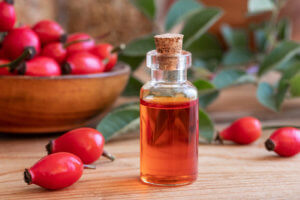
Roses bring a familiar fragrance to skincare as well as soothing, anti-aging properties. The petals can be infused into water or distilled to make a hydrosol that may help calm skin irritation and redness. Rose petals also contain antioxidants that help to keep skin cells healthy.
Rosehips, the fruit of the rose plant, bring even more skin benefits.
They are packed full of vitamin C, an extremely important nutrient for boosting collagen (the anti-sag, anti-wrinkle protein), plus other powerful antioxidants. Rosehip seed oil contains these nutrients and fatty acids that deeply nourish and moisturize your skin.
Chamomile
Chamomile extract is another top herb to use for your skin. It has a natural anti-inflammatory effect that helps to calm redness and irritation, making it especially beneficial for sensitive skin. Levomenol, a specific compound in chamomile, is also a natural moisturizer for skin.
Even better, chamomile contains a powerful antioxidant compound known as apigenin.
Apigenin and levomenol both have an anti-aging effect on skin, diminishing signs of aging and improving skin texture and elasticity. Chamomile extract is also known to promote wound healing, which suggests it could boost collagen levels as well.
Calendula
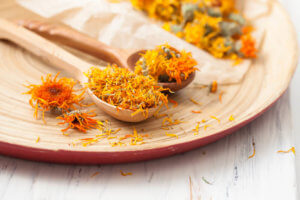
Calendula has been one of the top herbs for the skin for a long time. The bright orange-yellow flowers of this plant are the part used in skincare because of the many volatile oils stored in the green base of each flower head.
One of the biggest benefits of calendula is that it contains numerous antioxidants, including flavonoids and carotenoids. This gives calendula extract anti-inflammatory properties and an ability to help protect your skin cells from damage and aging.
Calendula is also very soothing and moisturizing for dry or damaged skin, particularly when used in a cream. The flowers even have antiseptic properties that help wounds to heal more quickly.
Amla (Indian Gooseberry)
Amla, also known as Indian gooseberry, is an Ayurvedic herb that is outstanding for your skin.
The berries of the amla plant are packed full of vitamin C (with 20-30 times more than oranges!). This means that whether you consume the berries or apply amla extract to your skin, the vitamin C will boost collagen synthesis and decrease the appearance of skin aging.
That’s not all, though.
Amla berries are also one of the top antioxidant foods in the world. They contain up to 50 times more antioxidant capacity than blueberries! This translates to amazing protection for your skin cells from both free radical damage and UV damage— two major accelerators of wrinkle formation, thinning skin, dark spots, etc.
Camu Camu
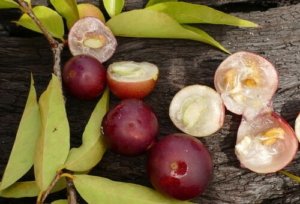
Camu camu is one of the best vitamin C herbs for the skin. It even beats out amla extract for vitamin C content with 30-60 times the amount you would find in an orange!
As we’ve briefly covered, vitamin C is one of the best nutrients for boosting collagen production in your skin. It can also help to lighten the appearance of dark spots and discoloration, making your skin tone look brighter and more even.
Camu camu also contains carotenoid antioxidants like lutein, beta-carotene, and zeaxanthin. These antioxidants work with the vitamin C to neutralize free radicals, slow skin aging, and protect skin cells from damage.
Lavender
Lavender is one of the most popular herbs of all time. It’s a top choice for a natural stress reliever and sleep aid— and is also cleansing and soothing for your skin.
Many of lavender’s skin benefits come from its anti-inflammatory and antimicrobial properties. This combination helps to soothe sensitive or irritated skin and also has mild cleansing action. It may even help to combat mild acne.
While you can simply use lavender buds in skincare, it has even more potent properties as an oil. At least one study has found that lavender oil promotes the healing of skin tissue and may also help to lighten hyperpigmentation. You can also use it to improve red or blotchy-looking skin and to add hydration to dry skin.
Aloe Vera
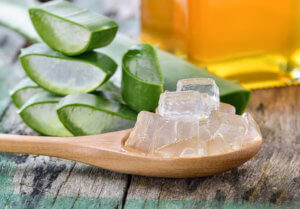
If we were to talk about ancient herbs for the skin, there’s none better than aloe vera. It has earned more than one nickname for its fantastic skincare properties, including the “burn plant” and the “miracle plant”.
There are over 130 different plant compounds in aloe and possibly more that haven’t been documented yet. It also contains the antioxidant vitamins C, A, and E and too many trace minerals to list. If that weren’t enough, aloe leaves are also naturally rich in water and contain mucopolysaccharides that help bind moisture to your skin.
So what does all that mean for skincare?
It means that aloe can effectively soothe a first- or second-degree burn and help other types of skin injuries to heal. It may even increase collagen levels and diminish the appearance of wrinkles. Aloe also boosts skin hydration, may help fade dark spots, and helps skin cells to regenerate.
There’s not much this botanical can’t do!
Chlorella (and Spirulina)
So far, all of the herbs on this list are most powerful when applied to your skin. (Although, vitamin C plants like rosehips, camu camu, and amla can also be great for your skin when consumed.)
However, what you feed your body has a big impact on your skin, either positively or negatively, and chlorella is a great example of this.
If you’ve never heard of it, chlorella is a green algae that mostly grows in freshwater. It has some of the most outstanding nutrition you will ever find in a plant with tons of vitamins and minerals as well as omega-3s, fiber, protein, antioxidants, and chlorophyll.
As far as your skin is concerned, chlorella is highly beneficial as one of nature’s most powerful detoxifiers. It helps your body to get rid of heavy metals and other toxins that contribute to inflammatory skin issues. The specific nutrients in chlorella (vitamin C, vitamin A, omega-3s) are also protective for your skin and slow aging.
Spirulina is a different blue-green algae that’s also rich in nutrients and chlorophyll. It hasn’t been as well researched as chlorella but may have similar skin benefits.
Consume one or both regularly for the best results.
Smartweed
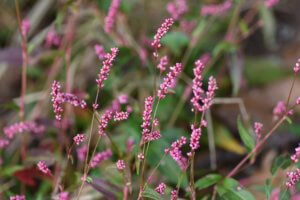
You may never have heard of smartweed, but it’s a secret weapon for anti-aging skincare.
The reason for this is that smartweed is incredibly rich in resveratrol— the powerful antioxidant also found in grapes and red wine. Unlike grapes, however, smartweed can easily be grown with no pesticides and little to no irrigation, which makes it very sustainable and affordable.
If you’ve heard anything about resveratrol, you may know how good it is for your heart.
Well, research has also shown that resveratrol works at the cellular level in your skin to prevent free radical damage and slow the aging process. It stimulates collagen production, protects elastin (another valuable skin protein), boosts hydration, brightens skin, and diminishes the appearance of wrinkles.
All good reasons to add smartweed to your skincare routine!
Green Tea
Green tea is another addition to the list of ancient herbs for the skin. Its health- and skin-boosting properties were known for a long time before modern research finally caught on to them.
What makes green tea so special is that it contains a specific antioxidant compound known as epigallocatechin gallate (EGCG). EGCG is so powerful that it may be able to help prevent cancer and other diseases. It also acts as a powerful anti-inflammatory agent to calm and brighten skin.
Green tea can be especially helpful for oily and breakout-prone skin. It possesses antimicrobial properties that fight acne and helps to balance oil production. However, it is not overly drying for skin.
Other studies have found that green tea has major anti-aging benefits for skin. It has been shown to improve skin elasticity, reduce skin damage caused by sun exposure, and boost skin moisture.
You can use green tea extract topically on your skin. You may also want to consider drinking matcha regularly because it contains up to 137 times more EGCG than other green teas!
Maple Leaf Extract
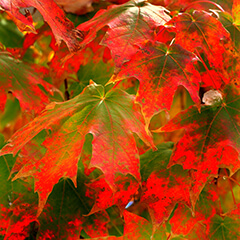
When it comes to keeping your skin looking youthful, collagen isn’t the only protein you should worry about.
Another skin protein, known as elastin, is also very critical for keeping your skin elastic and young-looking. The more your skin loses elasticity, the more saggy it will look and the easier it will be for wrinkles and fine lines to form.
In a perfect world, collagen and elastin work in concert to keep your skin thick, firm, supple, and wrinkle-free. Unfortunately, the production of both proteins declines in your body with age, which leads to a not-so-perfect scenario.
And while many of the vitamin C herbs on this list are great for boosting collagen, one stands above the rest as far as elastin is concerned: maple leaf extract.
Breakthrough research from 2018 discovered plant compounds in red maple leaves known as glucitol-core-containing gallotannins (GCGs). These compounds demonstrated an ability to block the action of elastase, an enzyme that breaks down elastin, protecting the valuable elastin in your skin.
They also showed potential to lighten dark spots and protect skin from inflammation.
In fact, the maple leaf extract demonstrated such powerful properties that one research likened it to a “plant-based Botox”!
Plant-Based Moisturizers
There are so many great herbs for improving skin hydration that it would take up too much space to list them separately. Of course, some of those previously mentioned (particularly aloe vera) do provide your skin with moisture, but here’s a quick look at some other excellent options.
Mango seed butter is rich in vitamin C, vitamin A, and vitamin E. It deeply nourishes skin with beneficial fatty acids, making it smoother and softer.
Cacao butter and shea butter are both exceptional for particularly dry or damaged skin. They each contain an array of various nutrients, antioxidants, and fatty acids.
Evening primrose oil is a more lightweight moisturizer that is particularly rich in gamma-linolenic acid (GLA). GLA is an omega-6 fatty acid that improves skin hydration, reduces inflammation, and may help acne.
Camellia seed oil has a similar molecular structure to your skin’s natural oil, allowing it to be deeply absorbed.
Of course, the list could go on to include sunflower oil, jojoba oil, olive oil, castor oil, etc.
Top Herbal Formula for Age-Defying Skin 
Any of the herbs on this list can be incredibly beneficial for your skin, so you can imagine how effective they would be when combined together.
If you are in the market for a 100% natural and plant-based anti-aging skincare cream (and don’t want to DIY your own version), look into the Age-Defying Dream Cream from Purity Woods. It contains many of the best herbs for your skin, including maple leaf extract, multiple moisturizers, and top vitamin C botanicals.
The Dream Cream is a one-of-a-kind formula that is entirely USDA Certified Organic. That means no toxins, no GMOs, and no synthetic or artificial ingredients. Every herb (and there are over 20!) is grown to strict organic standards with zero added chemicals.
Learn more about the Age-Defying Dream Cream here and how it harnesses the power of nature to quickly and effectively erase signs of aging like wrinkles, crow’s feet, age spots, etc.


